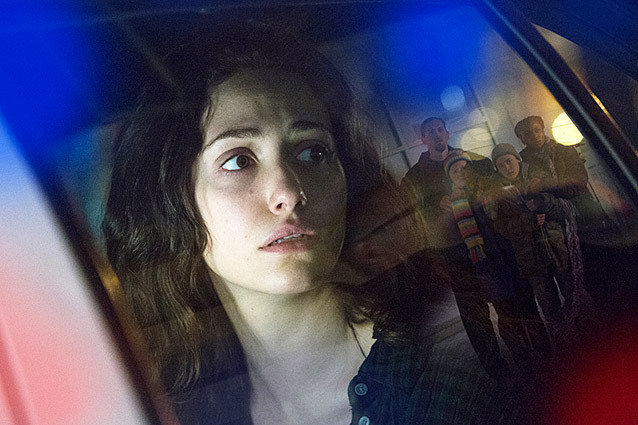 Showtime
Showtime
Shameless is one of the most controversial shows on television. Nothing seems to be off-limits. Incest, kids using drugs, and statutory rape are all fodder for jokes. And yet, the Showtime series can skirt being overtly offensive by injecting the right amount of heart, pathos, and authenticity. But is there a line that’s too far?
The Gallagher family survives no matter the cost. They will lie, cheat, or steal an old woman’s body to stay in the lap of luxurious poverty. Frank Gallagher (William H. Macy) is a deplorable human being. He will do anything in service of his addiction. Posing as gay to defraud an ex-gay organization, breaking his leg to collect and insurance, and prostitution are the short list of Frank’s most devious schemes. He even goes so far as to hit on his estranged biological daughter, Sammi (Emily Bergl) in an effort to manipulate her. At his core, he’s an addict. His entire life is defined by his need for drugs and booze. It’s not a get out of jail free card but it does make him a sympathetic character.
The series’ scams are not the only questionable source of humor. The Gallagher children are left to their own devices so they have to learn life lessons on the street. All the children have unfettered access to drugs and alcohol and a major lack of adult supervision. Carl (Ethan Cutkosky) is a borderline psychopath with a fixation on violence. Debbie (Emma Kenney) is 13-years-old and obsessed with losing her virginity. And yet, because these children have such deplorable family lives and the father from Hell, it seems to give their behavior some legitimacy rather than shock value.
One of the most potentially offensive storylines takes place in the episode “Where There’s a Will.” Shelia (Joan Cusack) attends a support group because her grandson has Down syndrome. A conversation arises about reclaiming the word “retard.” It instantly seems offensive to have a group of people with Down syndrome chanting the word “retard.” And yet, it opens up a dialogue about the “reclaiming” of slurs in general, like the n-word and the word queer. This is a valid debate that should be explored so it doesn’t seem gratuitous.
The series has some likable characters and some deplorable characters. The Gallaghers struggle so much that no matter what horrible things they do you still want them to succeed. Luckily, the show seems to establish some lines it will not cross. Despite the rampant sexuality of the older Gallaghers the series is keeping the younger children …children. Carl and Debbie may be fixated on sex but, to show’s credit, they are not actually having it. Although sexual assault has been a theme on the show (with Mandy Milkovich being a victim), Shameless does not make light of the issue whatsoever.
As far as racy subject matter goes, murder is (so far) the final line they have not crossed. Despite the occasional misdemeanors none of the main characters has committed murder. So at least human life is still valued on the show.
Despite the wild irreverent nature of the series, it has a moral code. When characters do wrong there are repercussions. The bulk of the violence on the show is either done in vengeance or to illustrate the poverty of the area. This season’s storyline for Fiona (Emmy Rossum) finds her facing a major reprisal for neglecting the family and self destructive choices.
Shameless pushes limits to serve a story. The scrappy protagonist family are oppressed by poverty, classism, and addiction. That breeds tension and discomfort and an offensive or outrageous joke is the release. There is a kill-or-be-killed, dog-eat-dog code of morality, but so far the show does seem to have established some healthy lines it won’t cross. And best of all, when it does push the envelope it is to make a statement.


